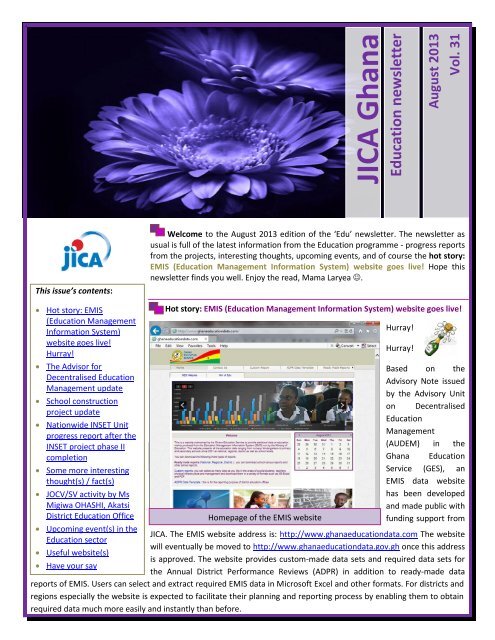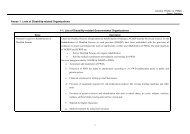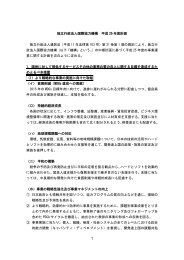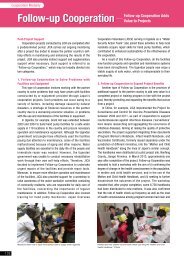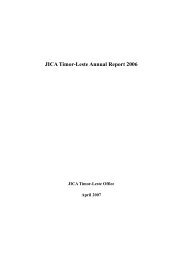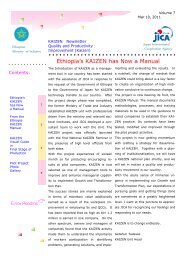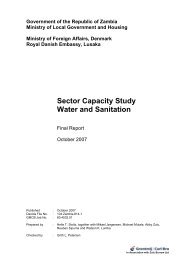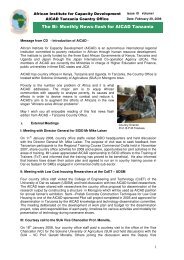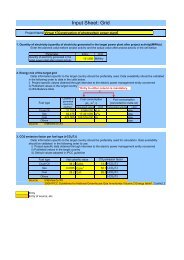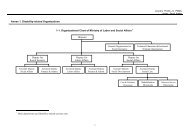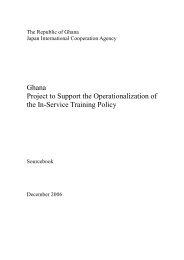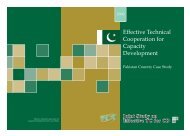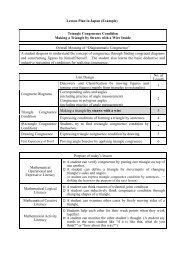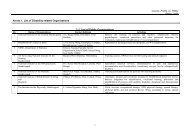Create successful ePaper yourself
Turn your PDF publications into a flip-book with our unique Google optimized e-Paper software.
<strong>JICA</strong> Ghana<br />
Education newsletter<br />
<strong>August</strong> <strong>2013</strong><br />
Vol. 31<br />
This issue’s contents:<br />
Welcome to the <strong>August</strong> <strong>2013</strong> edition of the ‘Edu’ newsletter. The newsletter as<br />
usual is full of the latest information from the Education programme - progress reports<br />
from the projects, interesting thoughts, upcoming events, and of course the hot story:<br />
EMIS (Education Management Information System) website goes live! Hope this<br />
newsletter finds you well. Enjoy the read, Mama Laryea .<br />
Hot story: EMIS<br />
(Education Management<br />
Information System)<br />
website goes live!<br />
Hurray!<br />
The Advisor for<br />
Decentralised Education<br />
Management update<br />
School construction<br />
project update<br />
Nationwide INSET Unit<br />
progress report after the<br />
INSET project phase II<br />
completion<br />
Some more interesting<br />
thought(s) / fact(s)<br />
JOCV/SV activity by Ms<br />
Migiwa OHASHI, Akatsi<br />
District Education Office<br />
Upcoming event(s) in the<br />
Education sector<br />
Hot story: EMIS (Education Management Information System) website goes live!<br />
Mr. Zakaria at the district (above)<br />
and national (below) awards<br />
ceremony<br />
Homepage of the EMIS website<br />
Hurray!<br />
Hurray!<br />
Based on the<br />
Advisory Note issued<br />
by the Advisory Unit<br />
on Decentralised<br />
Education<br />
Management<br />
(AUDEM) in the<br />
Ghana Education<br />
Service (GES), an<br />
EMIS data website<br />
has been developed<br />
and made public with<br />
funding support from<br />
<strong>JICA</strong>. Its address is:<br />
http://www.ghanaed<br />
ucationdata.com/,<br />
which will be moved<br />
to:<br />
http://www.ghanaed<br />
ucationdata.gov.gh,<br />
once this IP address<br />
is approved. IS data<br />
<strong>JICA</strong>. The EMIS website address is: http://www.ghanaeducationdata.com The website<br />
will eventually be moved to http://www.ghanaeducationdata.gov.gh once this address<br />
Useful website(s)<br />
is approved. The website provides custom-made data sets and required data sets for<br />
Have your say<br />
the Annual District Performance Reviews (ADPR) in addition to ready-made data<br />
reports of EMIS. Users can select reports and extract of EMIS. required Users EMIS can select data in and Microsoft extract Excel required and EMIS other data formats. in MS For Excel districts and other and<br />
regions especially the website is expected formats. Especially to facilitate for their districts planning and regions, and reporting the website process is by expected enabling to them facilitate to obtain their<br />
required data much more easily and planning instantly and than reporting before. process by enabling them to obtain required data much more<br />
easily and instantly than before.and students on my own initiative. Many organizations<br />
and individuals
Page2<br />
Aside of the EMIS website, from November 2012 to <strong>August</strong> <strong>2013</strong>, the Advisory Unit on Decentralised Education<br />
Management (AUDEM), which is supported by Mr. Daisuke Kanazawa, a <strong>JICA</strong> Expert, also completed the following<br />
activities:<br />
Support for annual performance review in districts and regions: performance reports such as ADPR 2012-13, Annual<br />
Review Progress Report (ARPR) 2012-13 were submitted to be used for the annual performance review processes in May<br />
and June. The Annual District Education Operation Plan (ADEOP) 2014-15 is due to be submitted by the end of <strong>August</strong>.<br />
This time the AUDEM supported regional officers to use their initiative to revise the templates of these documents to<br />
improve the quality.<br />
Training Programme on District Education Operational Planning and Performance Review (DEOPPR): the second<br />
training programme for planning and statistics officers in districts and regions on the DEOPPR was conducted in March<br />
and April. This time, the training cost for the 57 deprived districts covered by the Ghana Partnership for Education Grant<br />
(GPEG) were funded under the GPEG and the rest including those for regional officers were funded by <strong>JICA</strong>. In total 190<br />
officers benefitted from the programme. Like last year, lecturers of the four public training and research institutes,<br />
namely the Institute for Education Planning and Administration (IEPA) of the University of Cape Coast, the Centre for<br />
Educational Policy Studies (CEPS) of the University of Education Winneba (UEW), the National Centre for Research into<br />
Basic Education (NCRIBE) of UEW and the Ghana Institute of Management and Public Administration (GIMPA), delivered<br />
their lectures focusing more on practice than theory and on lessons learned from the last training sessions.<br />
Study Tour to Burkina Faso: from 21 st to 24 th July <strong>2013</strong>, the<br />
AUDEM organised a study tour to Burkina Faso to see how<br />
School Management Committees (SMC) in that country have<br />
been reactivated through the School for All project<br />
supported by <strong>JICA</strong>. The 10 member GES delegation was led<br />
by Mr. Stephen Adu, Director of Basic Education Division and<br />
included Education Directors of Tema, Savelugu-Nanton and<br />
Northern Region. Particular attention was drawn to the<br />
election of SMC members, SMC coordination councils whose<br />
members are also elected, and the high level transparency of<br />
school management through the periodical monitoring of<br />
school plans’ progress by general assemblies of SMCs, which<br />
seem to be critical elements for the reactivation of SMCs. The GES delegation having discussions in Burkina Faso<br />
Further studies are expected on how to reactivate SMCs in Ghana in reference to the experiences in Burkina Faso and<br />
other West African countries where SMCs have been successfully reactivated.<br />
ADEOP/ADPR review: The AUDEM conducted a review of the ADEOPs for <strong>2013</strong>-15, the ADPRs for 2011-12 and 2012-13,<br />
and submitted advisory notes on these results, except for the ADPRs for 2012-13 which is still under preparation. For the<br />
review of the ADPRs 2012-13, the AUDEM organised a workshop on 15 th and 16 th July to let the regional officers rate the<br />
ADPRs by themselves in view of the handing over of this exercise to the regional offices after the completion of the<br />
AUDEM’s work. The results show that the quality of these documents has been greatly improved particularly in terms of<br />
response to planning and reporting requirements. However, improvement on analysis of key indicators and the link<br />
between plans and performance reports is slow. Especially, financial planning and reporting remain very poor. On the<br />
other hand, technical knowledge and confidence of regional officers have also been greatly enhanced. The officers are<br />
expected to take the initiative to further improve the quality of the plans/reports.<br />
And finally, the AUDEM will complete its assignment period at the end of September <strong>2013</strong>. Before this period, support<br />
will be given to the Ghana Statistical Service’s efforts to generate official population projections including school age<br />
population. And in order to widen the views of the EMIS team, support will also be given through organising a study tour<br />
to India on EMIS. All the Advisory Notes including the above are available at https://sites.google.com/site/audembed/
Page3<br />
The school construction project<br />
We are pleased to report on the project for Improvement of Access to Basic Education in Deprived Areas. We recorded<br />
quite a few progresses at our project sites. From March, <strong>2013</strong>, 3 contractors have been able to hand over school sites in<br />
the following areas: (1) Kinkangu Junior High School (JHS) and Yunyoo JHS all in Bunkpurugu-Yunyoo District and (2)<br />
Tuoyiri primary in Sawla-Tuna-Kalba District. Each site has a 3 classroom block, headmaster’s office, Kumasi Ventilated-<br />
Improved Pit (KVIP) latrine and furniture. The Tuoyiri primary site also had Teachers’ Accommodation included.<br />
Unfortunately one of the contractors at Sawla was not performing so we had to terminate and re-tender and we are<br />
pleased to report that the new contractor has been able to complete and handover one lot to the Ministry of Education<br />
in July and <strong>August</strong> <strong>2013</strong> respectively. The schools are (1) Poru and (2) Gbelpie primary schools. Both sites each have a 3<br />
classroom block, headmaster’s office, KVIP, Teachers’ accommodation and furniture. Below are selected pictures.<br />
Top row: classroom block, teachers’ accommodation, KVIP. Bottom row: Deputy Director General GES address at<br />
handing over ceremony, keys handing over to the District Chief Executive of Sawla-Tuna-Kalba and inspection tour<br />
Some more interesting thought(s) / fact(s)<br />
From Finland's school system some more interesting facts (continued from the November 2012 edition):<br />
o Science classes are capped at 16 students so that they may perform practical experiments every class.<br />
o All teachers in Finland must have a master’s degree, which is fully subsidized.<br />
o Teachers are selected from the top 10% of graduates. In 2010, 6,600 applicants vied for 660 primary school training<br />
slots. [Source: http://www.businessinsider.com/finland-education-school-2011-12?op=1 last accessed: 20/08/<strong>2013</strong>]<br />
Nationwide INSET programme progress report<br />
The <strong>JICA</strong> teacher In-Service Education and Training (INSET) project that had been supporting the Teacher Education<br />
Division (TED) of the Ghana Education Service (GES) to implement the Nationwide INSET Programme came to an end on<br />
28 th February <strong>2013</strong>. Before the end of the project the third Joint Coordination Committee (JCC) meeting was held on 30 th<br />
January <strong>2013</strong> with 35 participants including the Deputy Director General GES, the Deputy Director Teacher Education<br />
Division (TED), the Director Basic Education Division, the Chairperson National Teaching Council (NTC), the Chairperson
Page4<br />
National Council for Curriculum and Assessment (NACCA), the Deputy Chief Inspector National Inspectorate Board (NIB),<br />
representatives of the teacher union, subject associations, the University of Cape Coast and development partners. The<br />
meeting reviewed the progress of the project and discussed the Pre-tertiary Teacher Professional Development and<br />
Management (PTPDM) policy. The project proposed an implementation structure and plan for the PTPDM policy. After<br />
the JCC meeting, the project also elaborated an implementation plan to support the TED.<br />
Building on the achievements of the project, the GES is continuing to implement the Nationwide INSET Programme.<br />
Activities undertaken successfully<br />
by the National INSET Unit (NIU) of<br />
the TED since their Japanese<br />
counterparts left include the<br />
following: (1)Dissemination and<br />
Validation Workshop for all 36<br />
Okayama –Japan Trainees and their<br />
District Directors, in which action<br />
plans were drawn by all the 9<br />
Workshop for Okayama Trainees<br />
Regional INSET Committee<br />
districts involved, (2) Lesson Observation Sheet (LOS) workshop for GES headquarters staff, (3) Workshop for Regional<br />
INSET Committee (RIC) members, (4) Workshop for District Master Trainers (DMTs) from the 57 deprived districts on<br />
Learner Centred Lesson Approach in Science, Maths and Literacy, and (5) Follow-up visits to the deprived districts which<br />
is ongoing up to the first week of September <strong>2013</strong>. The NIU is also writing other proposals which will cater for the<br />
training of DMTs from the non-deprived districts on the Learner Centred Approach.<br />
Further, the Ministry of Education (MoE) has on 13 th June <strong>2013</strong> launched the PTPDM policy. Prior to the launch the GES<br />
through the MoE had requested for Japan’s Technical Cooperation project to support the institutionalisation of the<br />
PTPDM policy. The request has been approved. In order to further formulate the proposed project to support the<br />
teacher policy, and with the permission of the MoE, a mission from Japan and <strong>JICA</strong> Ghana office is proposed from 24 th<br />
Sep to 4 th Oct <strong>2013</strong>. The mission would like to have discussions with related persons from the MoE, the NTC, the GES<br />
and related major DPs as well as make site visits to selected districts. It is hoped that through the nationwide<br />
implementation of the PTPDM policy, School Based INSET (SBI) and Cluster Based INSET (CBI) will be more firmly<br />
institutionalized to provide further opportunities for teachers to strengthen their teaching capabilities in the classroom<br />
and, as a result, improve the quality of education in Ghana.<br />
Japan Overseas Cooperation Volunteers (JOCVs) activity by Ms Migiwa OHASHI, Akatsi District Education Office<br />
Ms Migiwa OHASHI is a JOCV attached to the Akatsi District Education Office in the Volta region. The Akatsi district has<br />
99 primary schools. Ms Migiwa goes to these schools one by one with the aim of improving teachers’ teaching skill and<br />
raising pupils’ willingness to learn. The specific activities Ms Migiwa does as she visits these schools are as follows:<br />
1. The introduction of Teaching<br />
Learning Materials (TLMs) to teachers.<br />
For this, Ms Migiwa got funds from<br />
<strong>JICA</strong> to set up a resource room in the<br />
Akatsi District Education Office (DEO),<br />
displayed TLMs made by local<br />
materials, and also sent for<br />
mathematics kits from Japan through<br />
<strong>JICA</strong>. All in order to teach effectively TLM resource room at Akatsi DEO Teachers using some TLMs<br />
teaching methods and educational tools that can be used to improve the basic learning of mathematics.
Page5<br />
2. Inviting parents to visit schools and observe their children’s classes. The<br />
understanding and support of not only teachers but also the community is<br />
indispensable for the improvement of an educational level. Ms Migiwa<br />
has been inviting and holding teaching sessions where parents of students<br />
have been participating in lessons positively. Ms Migiwa has been<br />
introducing the importance of the cooperation from not only the Parent<br />
Teacher Association (PTA) but also all parents in order for the school to<br />
raise its educational level in her lessons. In this connection, Ms Migiwa’s<br />
lesson which has many encouraging points for pupils has also been<br />
encouraging for parents. Parents have been absorbed in and take part in<br />
the lessons by expressing their own thoughts, same as the pupils.<br />
Parents observing pupils learning<br />
together<br />
3. Grasping pupils’ real ability. For this Ms Migiwa administers exams to<br />
Primary 1 (P1) and 6 (P6) students. By these exams, Ms Migiwa has come to<br />
the realization that the difference in ability between schools depends on<br />
whether teachers are serious and there being some difficult units in the<br />
curriculum for pupils to understand and for teachers to teach. With this<br />
knowledge Ms Migiwa could suggest to the District office and discuss with<br />
Circuit Supervisors (CS) what needs to be advised to head<br />
masters/mistresses and teachers.<br />
4. Hold “In-Service Training”<br />
promoted by Graph <strong>JICA</strong>. of Ms test Migiwa scores does this promoted by <strong>JICA</strong>. Ms Migiwa does<br />
this by trying to promote the stimulation of INSET through holding INSET<br />
workshops in every school. By this activity, Ms Migiwa could know that<br />
teachers learned of their own accord if hints on how to hold INSET and ideas of<br />
TLMs are given. Ms Migiwa plans to hold INSET for Curriculum Leaders (CLs) at<br />
regular intervals from now on, and is going to make ideas of teaching skills<br />
widely known. Should anyone be interested in this activity, please let Ms<br />
Migiwa know and join too.<br />
Ms Migiwa at an INSET workshop<br />
Upcoming event(s) in the Education sector<br />
o<br />
Four new JOCVs including two mathematics and science teachers and two basic education personnel will be arriving<br />
in October <strong>2013</strong><br />
Useful websites<br />
o Africa – A Brighter Future: read the full story in <strong>JICA</strong>’s World publication at<br />
http://www.jica.go.jp/english/publications/j-world/1305_vol20.html<br />
o<br />
o<br />
Checkout the <strong>JICA</strong> Ghana website for information on <strong>JICA</strong>’s activities in Ghana, Sierra Leone and Liberia:<br />
www.jica.go.jp/ghana/english/index.html<br />
Don’t forget we are online, old/new copies of this newsletter are available via the <strong>JICA</strong> Ghana English website:<br />
www.jica.go.jp/ghana/english/office/others/newsletter.html<br />
Have your say: and finally thank you for your reports, views and comments which<br />
make up this newsletter. Keep them coming including your feedback on the hot story<br />
in this issue, the address to use is: gn_oso_rep@jica.go.jp … Thank you.<br />
Eduko-san<br />
(child of education)


